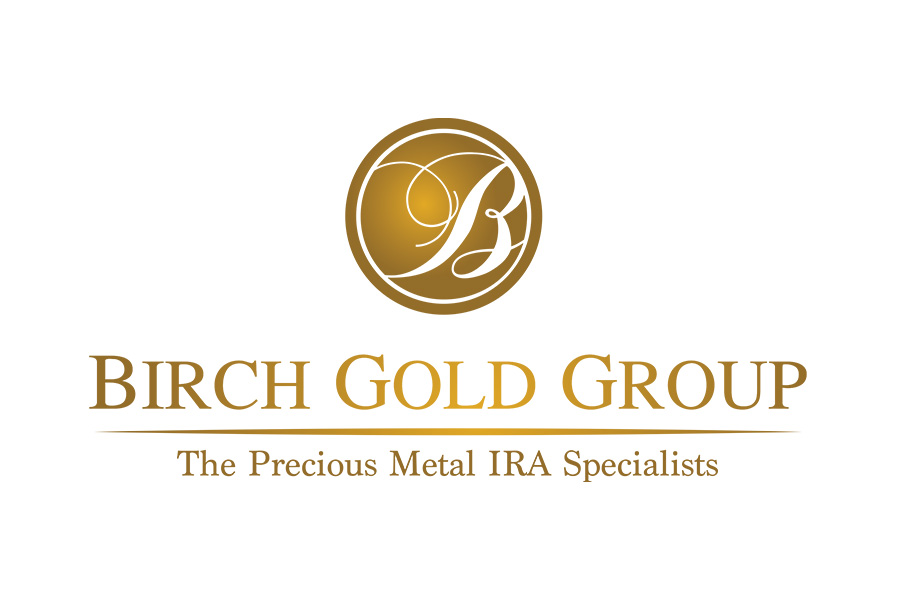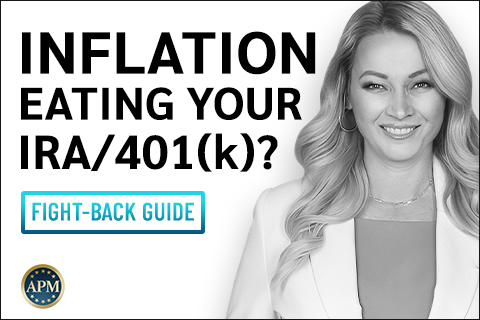Affiliate Disclosure
The owners of this website may be paid to recommend the following companies: Goldco, Augusta Precious Metals, Noble Gold Investments, and Birch Gold Group. The content on this website, including any positive reviews of the mentioned companies, and other reviews, may not be neutral or independent. We do believe in all the companies we recommend as being the most trustworthy in the business.

Gold has held a special place in human history as a symbol of wealth, prosperity, and security. In times of economic uncertainty and market volatility, many investors seek to protect their retirement savings by diversifying their portfolios with precious metals like gold. For those with a 401k retirement account, the idea of moving a portion of their funds to gold may seem appealing. However, before making such a significant decision, it’s essential to understand the regulations, tax implications, and methods involved in how to move 401k to gold without penalty.
How to Move 401k to Gold Without Penalty – Video
Get a free Gold IRA Kit
Get a free gold IRA kit now from a reputable company!
Understanding 401k
A 401k retirement account is a tax-advantaged savings plan offered by employers to help employees save for their retirement. The funds within a 401k are invested in various financial instruments, such as stocks, bonds, and mutual funds. While these traditional investment options have their benefits, some investors seek to diversify their portfolios by including alternative assets like gold.
401k accounts come in two main types: traditional 401k and Roth 401k. In a traditional 401k, contributions are made with pre-tax dollars, which means that taxes on the contributions and investment gains are deferred until the funds are withdrawn during retirement. On the other hand, Roth 401k contributions are made with after-tax dollars, providing the advantage of tax-free withdrawals during retirement.
The Benefits of Gold Investment:
Hedge Against Economic Uncertainty
One of the primary reasons investors consider moving their 401k to gold is to hedge against economic uncertainty. Gold has historically acted as a safe-haven asset during times of economic turmoil. When stock markets fluctuate, gold often remains stable, providing a valuable buffer for investors concerned about preserving their wealth.
During periods of economic instability, investors tend to flock to gold as a store of value. The precious metal’s scarcity and historical value as a form of currency make it a sought-after safe-haven asset. Gold’s performance during the 2008 global financial crisis is a testament to its ability to act as a hedge against economic downturns.
Portfolio Diversification
Diversification is a critical strategy for managing risk in any investment portfolio. By including gold in a retirement portfolio, investors can reduce their exposure to the stock market’s volatility. Gold’s performance tends to have a low correlation with other assets, making it an effective diversification tool.
The value of traditional financial assets like stocks and bonds can be influenced by various factors, such as interest rates, corporate earnings, and geopolitical events. Gold, on the other hand, often moves independently of these factors, making it a valuable asset to hold in a well-diversified portfolio.
Our Top Trusted Company Picks for 2023
Our recommended Providers are researched and vetted by us and many top consumer organizations. This is the short list of the most consistent companies we could come up with. Request information from them below.
#1: Augusta Precious Metals
Our Rating: 10/10
Pros
✅ ZERO complaints with the BBB and BCA
✅ Highest reputation and customer satisfaction in the industry
✅ The best “White Glove” service!
✅ Non-commissioned sales team
✅ Transparent pricing with up to 10 years of fees waved – with certain minimum investments
✅ NFL Legend Joe Montana actual customer before becoming their spokesperson
Call Augusta for your free gold kit now:
1-855-470-4636
Get FREE Gold when you open a gold IRA!
#2: Birch Gold Group
Our Rating: 9.9/10
Pros
✅ Great company commitment to education and communication
✅ Impeccable customer service
✅ Silver, gold, platinum and palladium available
Cons
❌ Signup process can only be done thought a specific link
❌ No buyback guarantee of precious metals
#3: Noble Gold Investments
Our Rating: 9.9/10
Pros
✅ One of the best no questions asked buyback programs in the industry
✅ Free delivery of your precious metals to your door at any time
✅ Over 20 years of experience in the precious metals industry
✅ Gold, silver, platinum, and palladium available
✅ Secure, exclusive storage in the
State of Texas
✅ One of the lowest barriers to entry – ideal for smaller investors
Cons
❌ High annual fees for low balances
❌ Offers common bullion only. Does not offer premium bullion or collectible coins
Call Noble Gold for your FREE Investing Kit!
1-626-684-4908
Safe-Haven Asset
In times of geopolitical tensions or financial crises, investors flock to gold as a store of value. The precious metal’s limited supply and universal acceptance make it a preferred safe-haven asset. During times of crisis, when traditional financial assets experience sharp declines, gold tends to hold its value or even increase in price.
Gold’s safe-haven status is not limited to individual investors; central banks and governments also hold significant amounts of gold as part of their foreign reserves. The stability and reliability of gold as a form of wealth have been demonstrated over centuries, making it an appealing asset for those seeking long-term financial security.
Regulations and Tax Implications
Before making any significant changes to a 401k, it’s crucial to understand the rules and tax implications involved.
Traditional 401k Withdrawal Rules
For investors with a traditional 401k, there are specific rules and penalties associated with early withdrawals. Typically, early withdrawals before the age of 59½ incur a 10% penalty in addition to income tax on the withdrawn amount.
The purpose of imposing early withdrawal penalties is to encourage individuals to leave their retirement savings untouched until they reach retirement age. The penalties serve as a disincentive for using retirement funds for non-retirement purposes.
How to Move 401k to Gold Without Penalty

Roth 401k Withdrawal Rules
Roth 401k accounts have different rules regarding withdrawals. Contributions to a Roth 401k are made with after-tax dollars, which means that qualified withdrawals during retirement are generally tax-free. However, early withdrawals of earnings may still incur penalties and taxes.
The advantage of a Roth 401k lies in its tax-free withdrawals during retirement. This feature can be especially beneficial for investors who anticipate being in a higher tax bracket during retirement or expect that tax rates may increase in the future.
Taxation on Gold Investments
The tax treatment of gold investments depends on the type of account used for the investment. When moving 401k funds to gold, investors often choose to transfer the funds to a Gold Individual Retirement Account (IRA). The taxation on gold investments within a Gold IRA follows similar rules as traditional IRAs.
Tax-Deferred Growth
One of the primary advantages of using a Gold IRA is tax-deferred growth. As with traditional IRAs, gold investments held within a Gold IRA can grow tax-free until retirement. This tax-deferred growth allows the investment to compound over time without the drag of annual taxes.
Taxable Distributions
When investors make withdrawals from a Gold IRA during retirement, the distributions are treated as taxable income. This means that the withdrawn amount will be subject to income tax at the individual’s applicable tax rate.
Required Minimum Distributions (RMDs)
Just like traditional IRAs, Gold IRAs are subject to Required Minimum Distributions (RMDs) once the account holder reaches the age of 72. RMDs are minimum amounts that account holders must withdraw from their retirement accounts each year to satisfy IRS regulations. The distribution amount is calculated based on the account balance and the individual’s life expectancy.
How to Move 401k to Gold without Penalty: Methods
Several methods allow investors to move their 401k funds into gold investments without facing penalties.
401k Rollover to Gold IRA
One of the most common methods is a 401k rollover to a Gold IRA. This involves transferring the funds from the existing 401k account into a self-directed IRA backed by physical gold. The process requires selecting a reputable gold custodian to hold and manage the precious metals on behalf of the investor.
Advantages of a Gold IRA
A Gold IRA offers several advantages over a traditional 401k. First and foremost, a Gold IRA allows investors to diversify their retirement savings by holding physical gold. This diversification can help protect the portfolio from the risks associated with traditional financial assets.
Second, a Gold IRA provides investors with more control over their retirement funds. In a traditional 401k, investment options are limited to those offered by the employer’s plan. In contrast, a self-directed Gold IRA allows investors to choose the types of gold they want to hold, such as gold bars or gold coins.
Third, a Gold IRA can provide a hedge against inflation. Gold has historically served as a store of value and has often retained its purchasing power over time. During periods of inflation, when the value of paper currency decreases, gold can act as a valuable hedge.
Selecting a Gold Custodian
When moving 401k funds to gold, selecting a reputable and trustworthy gold custodian is crucial. The custodian will be responsible for storing the physical gold and ensuring its safety.
Reputation and Experience
When choosing a gold custodian, it’s essential to research their reputation and experience in handling precious metals. Look for custodians with a long-standing track record of providing secure and reliable services to investors.
Storage and Security
The storage and security of the physical gold are of paramount importance when selecting a gold custodian. Gold custodians should have secure and insured storage facilities to protect the precious metals from theft, damage, or any unforeseen circumstances.
The gold storage facility should meet high-security standards, including 24/7 surveillance, alarm systems, and controlled access to ensure the safety of the investors’ assets. Additionally, the custodian should have proper insurance coverage to provide further protection in the event of any unfortunate incidents.
Investors should also inquire about the custodian’s auditing practices. Regular audits by independent third-party firms can provide additional assurance that the gold holdings are accurate and accounted for properly.
Fees and Costs
Gold custodians typically charge fees for their services, including storage and administration fees. It’s essential for investors to understand the fee structure of the custodian before making a decision. While the fees associated with storing and managing physical gold are reasonable, investors should be cautious of custodians with exorbitant or hidden fees.
Some common fees charged by gold custodians include an annual storage fee, administration fee, and transaction fees for purchasing or selling gold. It’s essential to compare fee structures among different custodians to find one that offers competitive pricing and transparent costs.
Investors should also be aware of any additional fees that may be charged for specific services, such as requesting an audit or making a withdrawal. A reputable gold custodian will be upfront about their fee structure and should provide clear explanations of all charges.
Starting the 401k to Gold Transfer
Once a suitable gold custodian is chosen, the process of transferring 401k funds to gold can begin. The steps involved in this process require careful attention to detail to ensure a smooth and seamless transfer.
Reviewing Your 401k Portfolio
Before initiating the transfer, it’s crucial to review your current 401k portfolio and determine the percentage of funds you want to allocate to gold. Carefully assess your investment objectives, risk tolerance, and retirement timeline to make an informed decision about the amount of gold you wish to hold in your retirement account.
Investors should also consider consulting with a financial advisor to get personalized advice based on their specific financial goals and circumstances. A financial advisor can provide valuable insights and help you determine the most suitable allocation of gold within your overall investment strategy.
Contacting a Gold Custodian
Once you’ve decided on the amount of gold you wish to include in your retirement portfolio, it’s time to contact the chosen gold custodian. Reach out to their customer service department to discuss the transfer process, fees, and any required paperwork.
The gold custodian’s customer service representatives should be knowledgeable, responsive, and willing to answer all your questions regarding the transfer process. They should be able to guide you through the necessary steps and provide clear instructions on how to proceed.
Limited Time offer!
Contacting a Gold Custodian
After gathering all the necessary information and documentation, you can begin the transfer process. The gold custodian will provide you with the required paperwork to initiate the transfer of your 401k funds to the Gold IRA.
The paperwork typically includes a transfer request form, where you’ll need to provide information about your current 401k account, the custodian, and the amount you wish to transfer to the Gold IRA. You may also need to provide identification and proof of ownership of the 401k account.
Once you’ve completed the paperwork, submit it to the gold custodian as instructed. The custodian will then work with your 401k plan administrator to facilitate the transfer of funds to the Gold IRA.
Yes, it is possible to move your 401k to gold without penalty by using methods such as a rollover to a Gold IRA or in-service distributions. These methods allow you to transfer funds from your existing 401k account to a self-directed IRA backed by physical gold without incurring early withdrawal penalties.
Gold can be a valuable addition to a retirement portfolio, as it offers diversification and acts as a hedge against economic uncertainties. While gold’s price can fluctuate in the short term, its historical performance as a store of value makes it an attractive long-term investment option.
Gold investments in a Gold IRA are subject to the same tax rules as traditional IRAs. As the gold investments grow within the IRA, they enjoy tax-deferred growth. However, when you make withdrawals during retirement, the distributed amount is treated as taxable income.
Yes, there are fees associated with transferring your 401k to gold. Gold custodians typically charge fees for their services, including storage, administration, and transaction fees. It’s essential to compare the fee structures of different custodians to find one that offers competitive pricing.
Yes, you have the option to transfer only a portion of your 401k funds to gold investments. Some investors choose to allocate a certain percentage of their retirement savings to gold while leaving the rest in their traditional 401k or other investments.
A direct rollover to a Gold IRA is generally recommended, as it involves transferring the funds directly from your existing 401k account to the Gold IRA. This method avoids the risk of penalties and taxes that could arise with an indirect rollover. With a direct rollover, the funds are transferred directly to the custodian of the Gold IRA, ensuring a smooth and tax-free transition.
An in-service distribution allows investors to move a portion of their 401k funds to a Gold IRA while still employed with their current company. This option provides flexibility for individuals who want to diversify their investments without leaving their job or reaching the typical retirement age.
With an in-service distribution, the employer’s 401k plan must offer this option to eligible participants. Eligibility criteria may vary, so it’s essential to review the specific rules of your employer’s plan. If you meet the requirements, you can request to transfer a portion of your 401k funds to a self-directed Gold IRA while continuing to work for your employer.
Generally, you can transfer your 401k to gold at any age once you meet the eligibility criteria set by your employer and plan administrator. However, it is essential to review the specific rules of your 401k plan, as some plans may have restrictions on when and how you can move your funds.
While gold is considered a safe-haven asset, it is not without risks. Gold prices can be subject to volatility and fluctuations, just like any other investment. Additionally, as with any investment, past performance is not indicative of future results.
Investors should be aware that the value of gold can be influenced by various factors, including changes in global economic conditions, interest rates, and geopolitical events. While gold has historically retained its value over the long term, short-term price movements can be unpredictable.
The Internal Revenue Service (IRS) has specific guidelines regarding the types of gold investments allowed in a Gold IRA. Generally, the IRS permits investment in certain types of gold bullion and specific gold coins that meet their purity and quality standards.
For example, the IRS allows investment in gold bullion with a minimum fineness of 99.5% and gold coins minted by certain government authorities, such as the American Gold Eagle and the Canadian Gold Maple Leaf. It’s essential to consult with your gold custodian to ensure compliance with IRS regulations and determine which gold investments are eligible for your Gold IRA.
Withdrawing gold from a Gold IRA before reaching retirement age may result in penalties and tax implications. The IRS imposes a 10% early withdrawal penalty on distributions taken before the age of 59½, in addition to any applicable income taxes on the withdrawn amount.
Gold held within a Gold IRA is intended for retirement savings, and early withdrawals defeat the purpose of the account, which is to provide financial security during retirement. Investors should carefully consider their long-term investment objectives before making any early withdrawals.
Gold’s performance can vary over time, and it may not always outperform other investment options. Its value is influenced by various factors, including global economic conditions, interest rates, and geopolitical events. As a result, the performance of gold can be different from other traditional assets like stocks and bonds.
Historically, gold has shown its ability to act as a store of value and provide a hedge against inflation and economic downturns. However, it is crucial to remember that past performance is not a guarantee of future results. Investors should carefully assess their risk tolerance and consider how gold fits within their overall investment strategy.
Holding physical gold directly in a 401k account is generally not allowed. The IRS requires that gold investments held within a retirement account be in the form of “investment-grade” coins or bars. As a result, when moving a 401k to gold, the physical gold is typically held by a custodian in a secure and insured vault on behalf of the investor.
Investors should not attempt to hold physical gold themselves within their retirement accounts, as doing so could result in disqualification of the account and adverse tax consequences.
The ability to transfer funds from your employer’s 401k to a Gold IRA while still employed may depend on your plan’s specific rules and provisions. Some 401k plans may allow for in-service distributions, while others may not.
An in-service distribution allows participants to transfer a portion of their 401k funds to a self-directed IRA, such as a Gold IRA, while continuing to work for the employer. It provides an opportunity for individuals to diversify their retirement savings without leaving their current job.
Once you initiate the transfer of your 401k funds to gold investments, it is generally not reversible. Therefore, careful consideration and planning are necessary before making this significant financial decision.
Investors should thoroughly evaluate their financial goals, risk tolerance, and investment strategy before proceeding with a 401k to gold transfer. While gold can be a valuable addition to a well-diversified portfolio, it is essential to remember that all investments carry some level of risk.

Conclusion
Moving a 401k to gold without penalty can be a prudent strategy for investors seeking to diversify their retirement portfolios and protect their wealth during uncertain economic times. Gold’s historical status as a safe-haven asset makes it an attractive option for long-term investors looking to hedge against inflation and economic instability.
However, before making any investment decisions, it’s essential to understand the regulations, tax implications, and risks involved in moving a 401k to gold. Consulting with a qualified financial advisor can provide valuable guidance in tailoring your investment strategy to align with your specific financial goals and retirement plans.
Remember that every individual’s financial situation is unique, and what works for one investor may not be suitable for another. By conducting thorough research, seeking expert advice, and carefully evaluating your risk tolerance, you can make well-informed decisions that will contribute to a secure and prosperous retirement.






